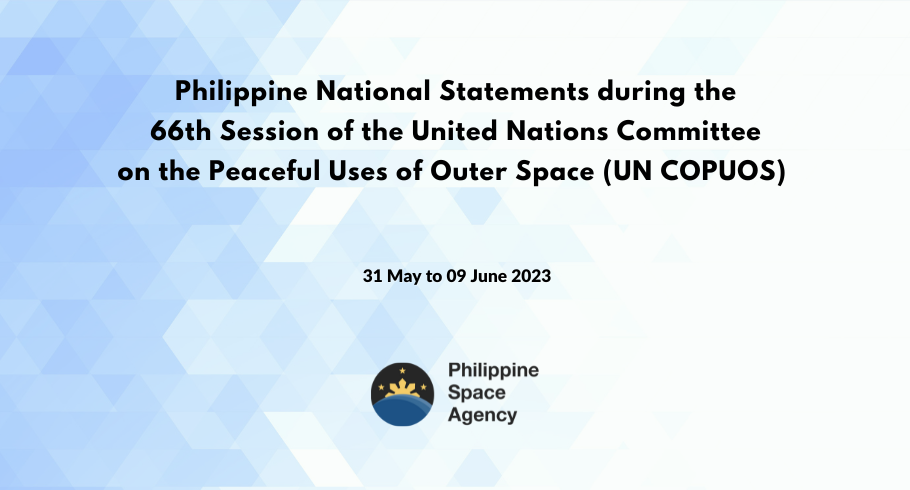The Philippine Space Agency (PhilSA) led the Philippine delegation to the 66th Session of the United Nations Committee on the Peaceful Uses of Outer Space (UN COPUOS) held in Vienna International Centre, Vienna, Austria, from 31 May to 09 June 2023. The delegation included representatives from the Department of Foreign Affairs (DFA) and the Permanent Mission of the Philippines in Vienna.
PhilSA Director General Dr. Joel Joseph S. Marciano Jr., PhilSA Director Atty. Noelle Riza D. Castillo, H.E. Evangelina Lourdes A. Bernas, Ambassador Extraordinary and Plenipotentiary and Permanent Representative to the United Nations and other International Organizations in Vienna, and Mr. Ivan Frank Olea, Deputy Chief of Mission, Embassy of the Republic of the Philippines, Vienna, delivered national statements during the UN COPUOS session.
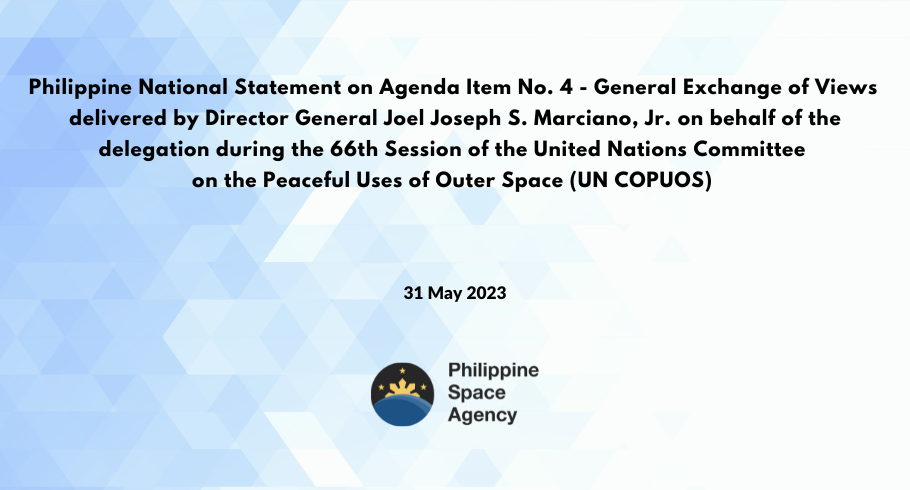
66TH SESSION OF THE UNITED NATIONS COMMITTEE ON THE PEACEFUL USES OF OUTER SPACE
PHILIPPINE STATEMENT
AGENDA ITEM NO. 4 “GENERAL EXHANGE OF VIEWS”
delivered by
DR. JOEL JOSEPH S. MARCIANO, JR.
DIRECTOR GENERAL
PHILIPPINE SPACE AGENCY (PHILSA)
Mister Chair,
The Philippines extends its appreciation to you, Mister Chair Omran Sharaf of United Arab Emirates, and to the dedicated staff at the United Nations Office for Outer Space Affairs (UNOOSA), for the successful conduct of the 65th Session of the United Nations Committee on the Peaceful Uses of Outer Space (UN COPUOS) last year and the excellent preparations for this year. Since this is the first time that our delegation will speak at this session, we express our gratitude for the opportunity to be physically present to participate in the proceedings. Please be assured of my delegation’s full cooperation and active participation in this 66th Session of the UN COPUOS.
Recognizing the importance of utilizing the relevant platforms and mechanisms of diplomacy and international cooperation, our country has been actively navigating opportunities from the global space community as we continue to deepen and strengthen our space science and technology ecosystem.
We signed cooperation agreements with the UAE Space Agency and entered into agreements with Space for Climate Observatory, Philippine-American Educational Foundation, Hokkaido University, and last month with Argentina National Space Activities Commission. These agreements cover cooperation in capacity-building activities, research and development, scientific missions on space explorations, as well as the promotion of space industry and industrial cooperation.
As we support the efforts toward the universalization of outer space treaties, my delegation wishes to reiterate our declaration during the 62nd Session of the Legal Subcommittee, that we have received support from other relevant Philippine government agencies for the ratification of Liability Convention and accession to the Registration Convention. Hence, we are nearing the ratification status of the UN space treaties. Through these treaties, we signify our strong commitment to global norms and principles that strengthen our institutions and enable good governance through space activities.
It is also my honor to inform you and distinguished delegates that our country will launch the National Registration System for Space Objects. The online registration system will serve as the national database for space launch activities and registration of space objects. Through this national effort, we would be able to support the development of legal systems, norms, policies, and programs pertaining to outer space activities.
The Philippine Space Agency (PhilSA) also developed a children’s book that aims to introduce UN outer space treaties at the primary education level. Through this book, our hope is to encourage the country’s next generation to explore, develop, and pursue interest in space science and other allied fields responsibly and sustainably.
Mister Chair and distinguished delegates,
The Philippines recognizes its role in promoting the use of space data to support strategies to address the intensifying adverse impacts of climate change and the achievement of sustainable development goals. Thus, we are pleased to inform you that the National Copernicus Support Action Program for the Philippines or CopPhil has been launched. Co-implemented by the PhilSA, Department of Science and Technology, and European Space Agency, CopPhil complements current national space data mobilization efforts by strengthening the utilization of Copernicus Earth Observation data for Disaster Risk Reduction Management and climate action in the Philippines and our region. PhilSA will facilitate access and distribution of the Earth Observation data through the Copernicus mirror site to be established in the Philippines. We thank the European Union for bringing this program to the Philippines.
As an emerging space capable nation, the Philippines believes that we can contribute to the effort in ensuring the sustainability of outer space activities through the Space2030 Agenda and the SDGs. We will elaborate further on our efforts in our statements for Agenda Items 8, 10, and 15.
In closing Mr. Chair, the Philippines reaffirms its commitment to preserve the peaceful and responsible use of outer space for the benefit of all humanity and as a matter of national importance. We believe that through cooperation and collaboration between and among the members of the global space community, we will push the frontiers of knowledge and humankind towards a safe, secure, and sustainable outer space for the benefit of the current and future generation.
Thank you, Mr. Chair.
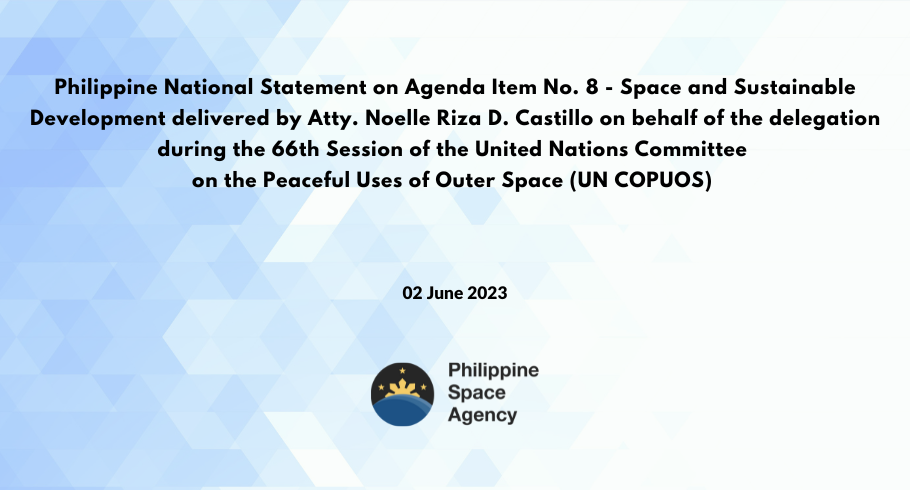
66TH SESSION OF THE UNITED NATIONS COMMITTEE ON THE PEACEFUL USES OF OUTER SPACE
PHILIPPINE NATIONAL STATEMENT
AGENDA ITEM NO. 8 “SPACE AND SUSTAINABLE DEVELOPMENT”
delivered by
ATTY. NOELLE RIZA D. CASTILLO
DIRECTOR OF THE SPACE POLICY AND INTERNATIONAL COOPERATION BUREAU
PHILIPPINE SPACE AGENCY (PHILSA)
Mister Chair,
On behalf of the Philippines, we wish to extend our appreciation to you, Mister Chair Omran Sharaf of United Arab Emirates, and to the dedicated staff at the United Nations Office for Outer Space Affairs (UNOOSA), for the excellent preparations for this year’s session.
The Philippines reaffirms our commitment to continue exploring and maximizing the opportunities offered by the global space community towards further developing our space capabilities that will ensure a safe, stable, and sustainable outer space. Along with these aspirations is our abiding commitment to pursue our national space programs while upholding the long-term sustainability goals and other guidelines set by UN regarding space activities.
In October 2022, the Philippines hosted the Technical Advisory Mission for the Space Law for New Space Actors Program of UNOOSA. We have taken the learnings of that mission imparted to key government agencies in the Philippines and currently applying them as we develop the governance framework of outer space activities in the Philippines, specifically as a launching state or as possible launch site. We thank UNOOSA, the government of Japan, and the expert speakers for bringing the program to the country.
We participated in the Asia-Pacific Regional Space Agency Forum (APRSAF) in the Second Phase of the National Space Legislation Initiative in 2022. Together with the other participants i.e. Australia, India, Indonesia, Japan, Malaysia, New Zealand, the Republic of Korea, Singapore, Thailand, Turkey and Viet Nam, we have prepared the report that has been submitted as a working paper in this 66th Session of the UN COPUOS. With this report, we are building collaboration among nations by sharing information about our national space frameworks. We thank APRSAF for the effective management of the NSLI that has produced the report to enrich our global legal resource about space legislation.
Domestically, we have gained much progress towards creating a standard and national response to incidents of orbital debris that fall anywhere on the Philippine territory and where we exercise jurisdiction. We have achieved this through a whole-of-government approach by building close communication and coordination mechanisms among concerned government agencies.
Mr. Chair,
I would like to share with my distinguished colleagues that since the creation of our Technical Working Group on Orbital Debris Protocols, we have fleshed out common issues experienced on the ground. The said Group will build more efficient and effective inter-agency cooperation to address the threats from orbital debris incidents. It also serves as an advisory body for the coordination, discussion, formulation, and integration of strategies, protocols, guidelines, and similar mechanisms. Thus, it promotes and ensures appropriate responses to rocket launches and other outer space activities that can pose risks to the Philippines and the region.
With the rapid progress in space science and technology applications and the emergence of space-capable nations and actors, we believe that all space actors have a responsibility in advancing our sustainable goals. The goal is to seek solutions to reduce the threats from space debris and install measures to minimize them. Towards this goal, the Philippines is also actively contributing to the discussions on establishing norms and principles of responsible behaviors in outer space.
Finally, Mr. Chair, we encourage the dialogue with all actors in the global space community to be more committed and proactive in adherence to the norms and principles, which will utilize and promote the peaceful uses and sustainability of outer space activities.
Thank you, Mr. Chair.
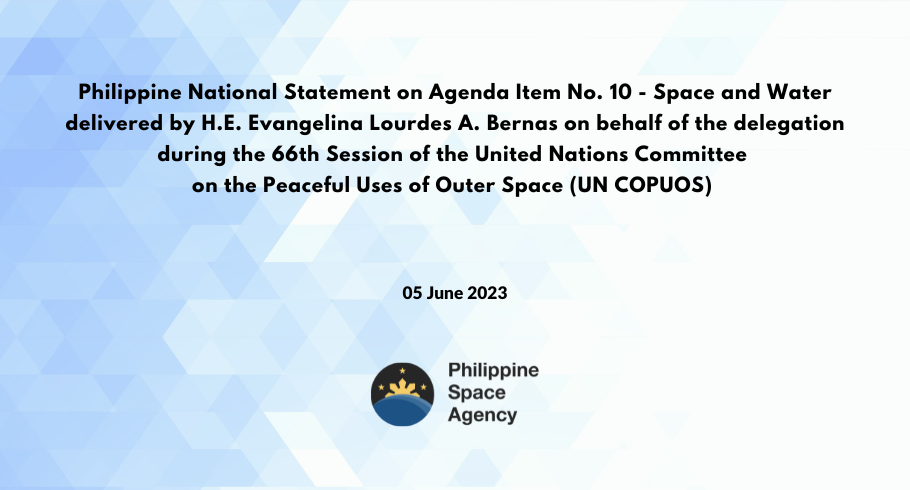
66TH SESSION OF THE UNITED NATIONS COMMITTEE ON THE PEACEFUL USES OF OUTER SPACE
PHILIPPINE NATIONAL STATEMENT
AGENDA ITEM 10 “SPACE AND WATER”
delivered by
H.E. EVANGELINA LOURDES A. BERNAS
AMBASSADOR EXTRAORDINARY AND PLENIPOTENTIARY AND PERMANENT REPRESENTATIVE TO THE UNITED NATIONS AND OTHER INTERNATIONAL ORGANIZATIONS IN VIENNA
Mr. Chair,
The Philippines once again extends its appreciation to you and to the dedicated staff of the Secretariat for the excellent preparations for this year.
Mr. Chair,
The Philippines, as an emerging space-capable country, reaffirms our commitment to a safe, secure, and sustainable outer space. Among the key areas the country wishes to emphasize is the use of space technology in water resources management.
The country recognizes that water is a limited resource and requires proper management and allocation. Currently, water scarcity is considered a global crisis exacerbated by the intensifying adverse effects of climate change. The use of space technology will play an important role in water management.
Specifically, space and satellite technology applications (SSTA) are needed to understand the threats to water resources and identify the affected vulnerable sectors of society. Hydrological information is commonly insufficient in developing countries. Hence, the need to capitalize on SSTA is imperative for various applications including remote sensing to discover and assess water resources, to monitor floods, to assess droughts, and identify their impacts to various sectors and to the economy, among others.
Mr. Chair,
Space data also enables us to analyze, plan and decide on efficient water use and allocation, and influence decision making across all sectors requiring water including agriculture, health, and energy, among others.
A concrete water resource issue exacerbated by climate change is El Niño, which results in drought in the Philippines, a slow onset and natural recurring climate hazard that has long been affecting the country’s agricultural sector. This year, El Niño is expected to start by the third quarter and this event prompted the reactivation of our El Niño Task Force (ENTF) to mitigate its effects on four target areas, namely, food security, energy security, health, and safety.
Space science, specifically the use of earth observation tools, are essential in delivering timely information that both complements station-based climate observations and acts as the basis for seasonal forecasts. The Philippine Space Agency (PhilSA) contributes to the national efforts and builds on top of the previous and existing drought research in the country through Satellite Mission Analysis, Planning, Product Enhancement and Development (SatMAPPED) project to reduce if not avert potential losses and damages.
Moreover, the Philippines emphasizes the value of using satellite technology and applications to provide access to comprehensive and local level datasets to come up with appropriate intervention measures. My delegation is pleased to inform you that the country generates satellite-derived agricultural drought indices and agricultural drought outlook for anticipatory action, in coordination with appropriate government agencies. It also leads the development of the National Agricultural Drought Protocol in coordination with various government agencies, including academic and research institutions and other international organizations, such as Food and Agriculture Organization and World Food Programme.
Mr. Chair,
The Philippines supports the agenda of continuously advancing SSTA towards more effective and efficient management of water resources. Through cooperation and collaboration, we believe that developing countries such as the Philippines will benefit on these technological solutions. Moreover, we strongly believe in further improving science, technology, engineering education and mathematics, and to encourage and capitalize on the youth to be more involved in science and technology.
In closing, Mr. Chair, the Philippines remains positive as it ceaselessly engage to a broader participation and in-depth cooperation with other nations to achieve a more sustainable use of water resources using space science and technology as part of our commitment to adhere to the sustainable development goals.
Thank you, Mr. Chair.
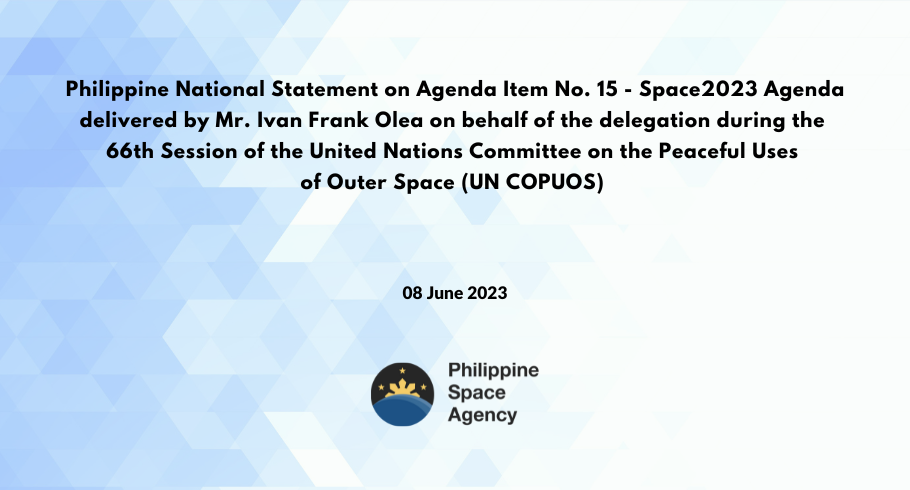
66TH SESSION OF THE UNITED NATIONS COMMITTEE ON THE PEACEFUL USES OF OUTER SPACE
PHILIPPINE NATIONAL STATEMENT
AGENDA ITEM NO. 15 “SPACE2030 AGENDA”
delivered by
MR. IVAN FRANK OLEA
DEPUTY CHIEF OF MISSION
EMBASSY OF THE REPUBLIC OF THE PHILIPPINES, VIENNA
Mr. Chair,
The Philippines welcomes the General Assembly’s decision to adopt the Space2030 Agenda, which highlights the role of the peaceful uses of outer space in achieving the 2030 Sustainable Development Goals, the Sendai Framework for Disaster Risk Reduction, and the Paris Agreement.
The Philippines, through its Philippine Space Agency (PhilSA), acknowledges the high relevance of space tools to attain the 2030 Agenda for Sustainable Development. We further emphasize that improved access to space-based data and applications and space infrastructure are imperative to fulfill the commitments on these global agenda which will address the needs specifically of the developing countries.
Mr. Chair,
The Philippines places great value on promoting the use of space technologies and their applications to enhance scientific knowledge of the natural environment from ridge to reef, for conservation, protection, rehabilitation and sustainable use of the ecosystems.
The Philippines also positions itself to strengthen the use of space applications to facilitate the observation of the climate and the assessment of disaster risks, improve early warning systems for disaster mitigation and provide data for the indicators used to track progress in the implementation of the 2030 Agenda for Sustainable Development, the Sendai Framework and commitments to the Paris Agreement.
As a display of our commitment, we are delighted to inform our Chair and distinguished delegates that the Philippines last year, signed the charter for Space for Climate Observatory in France, where the Philippine Space Agency currently serves as the national focal point.
The Philippines also recognizes the importance of advancing the role of space science and technology in highlighting, analyzing and addressing climate change and facilitating the transition to low-emission societies, and promote international collaboration in that regard, in line with existing and recognized international mechanisms and organizations.
In 2019, the Philippines issued a national policy through the Climate Change Commission Resolution Adopting a National Climate Risk Management Framework to Address the Intensifying Adverse Impacts of Climate Change. The use of space science and technology is crucial to provide location specific multi-hazard and multi-scenario probabilistic climate risk assessment to guide crafting of an anticipatory national and local planning, programming and budgeting to avert the potential losses, damages and disruption.
This landmark policy is likewise connected and important in promoting the use of space-based technologies in all phases of the disaster management cycle, applicable to both natural and man-made disasters, including prevention, mitigation, preparedness, response, recovery, reconstruction and rehabilitation, as well as monitoring and assessment of elements such as exposure, hazards, disaster risk and damages.
The Philippines underscores the value of data sharing in fulfilling the goals of Space 2030 agenda. With this, the country expresses gratitude and support to the International Charter (Space and Major Disasters), and we are happy to share that the Philippines already is a data provider node member of Sentinel-Asia since January 2023. Also, the Philippines takes this opportunity to acknowledge the utilization of GEMS data for hourly monitoring of air quality in the region.
Mr. Chair,
It is in this context that the Philippines highlights the importance of ensuring that opportunities for capacity-building and international cooperation are available, especially to developing countries, in implementing both legally and non-legally binding instruments in outer space, to contribute to the achievement of the Sustainable Development Goals through space, and to address global challenges such as climate change.
Our delegation also stresses the importance of a holistic approach towards achieving our shared goals. Thus, with regard to the future role and method of work of the Committee, we encourage the Committee and the Secretariat to continue initiatives and to study ways that enable closer coordination and engagement on the work of the two Subcommittees, and with bodies that are closely interlinked to its mandate, such as other UN bodies and international organizations, when applicable. This will ensure coordinated, relevant, and timely resolution to cross-cutting issues such as space debris mitigation, space traffic management, space and global health, space and climate change, long-term sustainability of outer space, space resources, and on matters relating to the geostationary orbit to name a few.
In closing, Mr. Chair, the Philippine commits to strengthen international cooperation, for which the Committee continues to provide a unique platform in the exploration and peaceful uses of outer space and the global governance of outer space activities, consistent with international law, considering the needs of developing countries.
I, Thank you, Mr. Chair.




